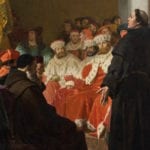Something new happened towards the middle of the eighteenth century. A great movement arose that coalesced around the idea and experience of being born again. It was called the Great Awakening.
Of course, ever since Jesus’ conversation with Nicodemus, Christians have understood the importance of regeneration—though different traditions have expressed it in different ways through the centuries.
Within reformed theology, Calvin had much to say about regeneration, but new pressures were at play a couple of hundred years later when the message of “being born again” (i.e. changing status and starting afresh) gained its prominence and power. By then, Christians were looking for new kinds of empowerment and the doctrine of regeneration—with its emphasis on the wonderful work of the Holy Spirit—was an attractive answer to that quest.
The idea of being ‘born again’ offered hope for a society where almost everyone thought of themselves as Protestant, yet where churches were in decline.
The idea of being “born again” offered hope for a society where almost everyone thought of themselves as Protestant, yet where churches were in decline. It resonated with philosophical and economic theories that stressed the worth and agency of the individual. The spatial language of new birth—moving from Adam to Christ or death to life—made sense in a world where people might cross oceans to settle in new places or change jobs to take advantage of new opportunities.
The eighteenth century was the era in which the individual conversion story proved so remarkably important to Christian spirituality. The lyrics of “Amazing Grace” reflect that emphasis.
Yet why did evangelical Christians want to use songs to tell their story? The early church had written creeds to declare its understanding of the Lordship of Christ and the nature of God as Holy Trinity. Later, in the Reformation, Protestants wrote denominational statements of faith—often called Confessions (such as the Heidelberg Confession or the 39 Articles)—to show how their church was different theologically from other Protestant groups.
But creeds and confessions weren’t well fitted to promote or describe the experience of regeneration; doctrinal exposition only goes some of the way to capturing the joy of salvation. Instead, songs and letters emerged as the chief media for celebrating new birth and the personal relationship with the Lord. While Enlightenment philosophers were marginalising God as a distant or non-existent creator, evangelicals proclaimed the Lord’s proximity in letters and songs.
John Newton
John Newton (1725-1807)—a prolific letter writer and hymn-writer—represented both of these strategies in spades. His most famous composition, “Amazing Grace”—which is 250 years old in 2022—stands as an enduring landmark of the Great Awakening and a magnificent gift to the church universal.
Newton was pastoring in Olney in Buckinghamshire at the time he wrote “Amazing Grace”, and first used its text in a talk on January 1st 1773—perhaps reading it out loud as part of his reflections to the congregation.
On one level, the story told by the song is Newton’s own: press-ganged into the navy at an early age and subsequently sold into the slave trade to captain its ships, Newton was amazed to become a Christian in 1748 after a storm at sea. In the hymn, that amazement finds expression, not only in the title, but in the fact that “amazing” is the only word longer than one syllable in the first stanza.
“Amazing” is the only word longer than one syllable in the first stanza.
“Amazing Grace” is not a theological hymn. Newton isn’t trying to tell the story of the creation, nor the story of the church, nor even the story of Christ (the original version doesn’t even mention him). Rather, it is the story of the regenerate life. Even the last line: “We’ve no less days to sing God’s praise than when we first begun,” talks about new birth and Christian beginnings!
But the song is not about Newton alone. As with many psalms, it is worded in such a way that every reader will find emotional links. In the second stanza, we sing about our fears, their origin and their relief, which is a universal reality. In the third, we sing about the journey of life, having escaped many “dangers, toils and snares”; headed for the safe harbour of our home above.
This last reference relates to Newton’s life at sea, but everyone can relate to danger and rescue.
In the next stanza, Newton almost directly quotes from the psalms; declaring that the Lord “will my shield and portion be”—not ours, note, but mine. Nothing takes the focus away from my walk with the Lord, even though the experiences described are not strictly mine alone.
Newton thus uses everyday words to achieve a modest goal: to help his parishioners own their intimacy with the Lord. In the introduction to the Olney Hymns, he explained that his hymns were “designed for public worship and for the use of plain people.” No wonder this hymn has survived and is still one of the most sung hymns in the world today. Some have estimated that it is sung around ten million times annually.
Yet Newton’s songs were not intended as stand-alone poems. They were written to reinforce the message of a Bible reading and the sermon he was to preach from it. As a good pastor, Newton understood that his job in church or in a prayer meeting was to lead and to feed, as an under-shepherd should. His text that New Year’s Day in 1773 was from 1 Chronicles 17:16-17, recounting David’s amazement that his descendants would be set on the throne of Israel—despite his unworthiness of such honour.
Newton wasn’t worthy of the Lord’s grace either. Like Paul, in his own estimation, he was “the chief of sinners.” Like David, his leadership among God’s people had been unexpected. Other Scriptural allusions in “Amazing Grace” speak of being sick, blind and lost—all of which reinforce the sense of sinful frailty.
“Amazing Grace” offers many insights into the origins of the evangelical movement. Evangelicals started out (and remain committed to) singing, combining feeling and thinking, bodies and souls, and the place of the individual within the group. We love to retell the message of the Scriptures with the freshness of our own voices and vocabulary. We want others to share an experience of the Lord that has meant so much for us, so we capture in song something of our own priorities and prayers. Assurance at the beginning of the Christian walk—not just at the end—has been an evangelical distinctive, which is nurtured in our public praise. And with Newton’s craftsmanship in writing hymns, it is no surprise that “Amazing Grace” still has power to inspire. A lesson for song-writers today!















